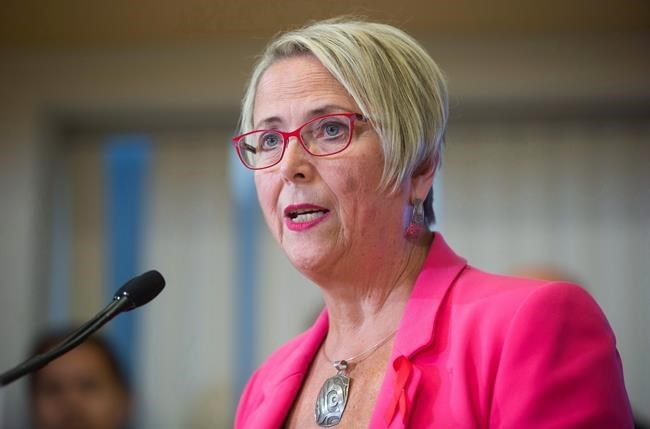Hospitals will be allowed to keep youths for up to seven days after an overdose, to allow time to stabilize them, contact a parent and create a plan for voluntary help, under rule changes being proposed by the province.
“What this legislation does is create a new part of the Mental Health Act to provide short-term stabilization care for a youth in the immediate aftermath of an overdose,” said Judy Darcy, minister of mental health and addictions.
The bill, if passed, would allow hospitals to involuntarily admit a youth under age 19 who overdosed for an initial 48 hours, to regain their decision-making capacity, and that could be extended another five days for a total of seven.
The recommendations stem from clinicians seeing youth walk out of hospital emergency rooms just hours after being resuscitated only to use drugs again.
The idea that a youth — who has just been revived, is possibly brain injured because they stopped breathing, and might be under the influence of a days-long binge on opioids — can make a good decision “is totally wrong,” said Dr. Tom Warshawski, chairman of B.C. Pediatric Society’s secure care working group and medical director for child and youth for the Interior Health Authority. “They are stunned, they are stunned for hours afterward. They are just not thinking clearly.”
Warshawski, who was among clinical experts, and child and youth advocates who made recommendations to the government, said work on the issue has been going on for years.
“I feel that it is a very important first step in an ethical approach to youth with a serious substance-use disorder,” he said.
This year up to the end of May, six youth under age in B.C. have died of suspected illicit drug overdoses, according to the B.C. Coroners Service. There were 13 in 2019, 18 in 2018, 25 in 2017, and 12 in 2016.
More time — 48 hours and possibly another five days — is needed to “hit the pause button,” assess the youth medically and mentally, contact a designated parent and counsellors, and put in place safety measures, Warshawski said.
A designated physician will decide on the youth’s competency based on the criteria “that a youth is considered to be stable if they understand they’re engaged in severe problematic substance use and the related consequences and the youth has the capacity to make decisions about health care and community support to address their substance use challenges.”
The process also includes parents or guardians, which Darcy called “a really important piece.”
A “responsible adult” will be designated to act on behalf of the youth to ensure their best interests are protected and promoted, she said.
“We certainly recognize that families can play a really important role in the stabilization and in their transition to treatment and so this amendment provides greater clarity for parents and physicians,” Darcy said.
The adult will be informed of the facts of the admission, youth’s rights, and personal information in the course of providing care unless contrary to the youth’s best interests.
The province’s chief coroner, Lisa Lapointe, said in a statement it is important that work being done to reduce the fear and stigma related to substance use is not undermined by the legislation.
“Without an established evidence-based, accessible system of substance-use treatment services, I am concerned there is the potential for serious unintended consequences as a result of these legislative amendments, including the potential for an increase in fatalities,” Lapointe said.
Darcy made note it's been two years since the fatal overdose of Oak Bay teen, Elliot Eurchuk, on April 20, 2018.
After his first overdose, his parents, despite being at their son’s bedside, were not privy to their son’s medical information including what he overdosed on, his prior drug use or his treatment plan.
Rachel Staples, Eurchuk’s mother, said the legislation is one step forward, but there are many more that need to be taken.
“They need more beds and they need more treatment facilities,” she said.
The proposed short-term emergency care will be provided at 51 hospitals where there is an existing designated psychiatric unit or observation unit. On Vancouver Island those include: Victoria General and Royal Jubilee in Victoria; Nanaimo Regional General; Cowichan District; West Coast General in Tofino; Cowichan Lodge in Duncan; and Jack Ledger House in Victoria.
Once the youth has regained their decision-making ability, there is no involuntary medical treatment or substance-use treatment.
Experts from B.C. Children’s Hospital, other youth and child psychiatrists, and mental health and addiction experts say forcing youth into drug treatment “can have very negative consequences that lead to distrust of the healthcare system,” Darcy said. “There’s no evidence it helps.”
There are services and programs the youth can be released into, but ideally “as soon as the youth wants a bed, they can call them,” Warshawski said, adding: “We’re not at that point yet.”
Vancouver Island has 25 youth treatment beds, including seven supportive residential services beds, four transitional services beds, 11 withdrawal management or detox beds, and three supported housing beds.
Warshawski likens the shortage of treatment beds for addicted youth to discharging an adult cardiac patient hours after a heart attack. “You don’t say, ‘Well, sorry, we’ve got a bed for you in four weeks,’ ” Warshawski said. “This is an emergency; this has to be available. We need more capacity.”



